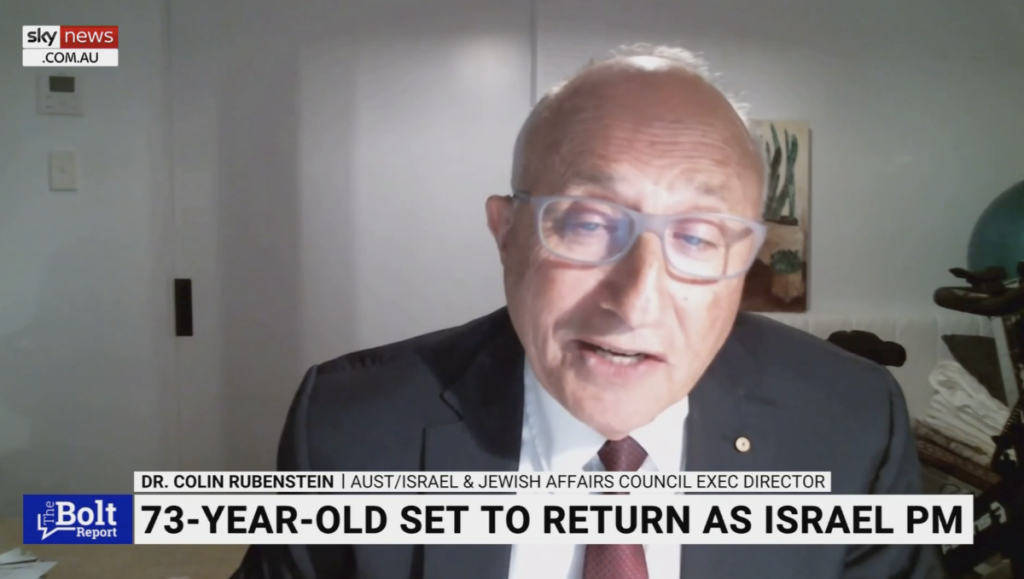IN THE MEDIA
Israeli elections – Colin Rubenstein on Sky News’ Bolt Report
November 4, 2022

TRANSCRIPT
Bolt: The ABC isn’t happy with the election result in Israel. “Exit polls point to another win for Benjamin Netanyahu despite a corruption trial,” it says. Well, the shorter version, ABC version, right-wing crook wins. But is that really why Netanyahu is back for a sixth time as prime minister of the only true democracy in the Middle East? Joining me is Dr. Colin Rubenstein, executive director of the Australia, Israel and Jewish Affairs Council. Colin, always great to talk to you. Why is Netanyahu back as prime minister?
Colin Rubenstein: Well, the main reason is the people wanted him, although the result was surprisingly close. His block of parties, you know, only got probably 8-9,000 more votes than the other block. But the other block was much more fragmented and fractious and in difficult times, Netanyahu’s record as a very impressive leader when national security concerns are paramount, when terrorism has resurged very extensively in the last year or two and his known record on the economy is very, very positive. And he was an architect of the Abraham Accords. He’s a safe pair of hands, I think is the answer, addressing all those issues and despite some downsides, yes, an ongoing corruption trial is not a good look. But he denies the allegations, of course. It’s been going for a while. It will continue to go for a while. But he was able to build coalitions on his side of politics, which was the key difference in the outcome here. And, of course, in a way that’s a bit of a downside for him too.
Bolt: The coalition is exactly what’s offending particularly journalists of the left. He’s back in a coalition with some very right-wing hardline religious groups. How big a problem is that?
Colin Rubenstein: Look, I think it is a problem. It’s making mainstream moderate Israelis feel somewhat uneasy. In particular, you know, the party of Itamar Ben-Gvir and his colleagues, the religious Zionism Party, they do have an extreme record. He was a disciple of Rabbi Kahane, the extremist. So he has been uttering unacceptable, anti-Arab and extreme rhetoric. It’s not pretty. But of course, the time suited him in the sense that the security concerns are genuine and real, given the riots that we’ve seen and the terrorism that we’ve seen right up to the election. You know, several dozen Israelis have been killed this year, several thousand terrorist incidents. This is not frivolous. This is on people’s minds. And he played into that. But the real challenge now for Netanyahu, having brought together that coalition which brought him a victory, is to trend back to the centre. And I think his speech on election night saying he’s going to govern for all Israelis, Arab or Jew, left or right, was reassuring. And indeed that’s his record. Winning is one thing. Governing is something else. And let’s see what he does. But he has a record of being in government, a very sort of pragmatic, compromising and getting things done. And at a time when Israel has major issues and so do its neighbours, stemming from the threat of Iran and Iran’s proxies, the ongoing terrorism from Hamas, Palestinian Islamic Jihad, the threat of Hezbollah and so on. And this ongoing terrorism for new groups like the lions’ den and so on his record and his firmness, his commitment to strength, but also the ability to make deals, I mean, he does get on quite well on the international stage. He’s got a lot of experience.
Bolt: He sure does. We are running out of time. I need to ask you about Hamas, Colin. The Albanese government last month reversed the Morrison Government decision to move our embassy to the capital of Israel, Jerusalem. It said that it did this, it cancelled this move and wants to keep our embassy in Tel Aviv, doesn’t want to recognise Jerusalem as the capital. It said it did that to push a peace deal between Israel and the Palestinians. But in fact this decision was cheered on not by peace groups but by two Islamic terrorist groups. Hamas and the Palestinian Islamic Jihad. How betrayed do Jewish groups in Australia feel by Labor?
Colin Rubenstein: Well, very, very disappointed by that decision. And of course, the Morrison government immediately recognised West Jerusalem as Israel’s capital. We didn’t even move the embassy, unlike the Americans, for example. But to reverse that decision at this time when in the times of the Abraham Accords it’s seen, I think, as not only disappointing but counterproductive to the very aim of Labor, which is to encourage the parties, especially the Palestinians, to come back to the negotiating table. And what this decision does – and some other decisions that they’re making really – is reinforce that extremism and rejectionism, which encourages them to persist with it and not come to the negotiating table and to get their state alongside Israel. Of course, they want to still want a state instead of Israel. That’s the bottom line problem, which Hamas and Islamic Jihad make perfectly clear.
Bolt: Exactly. Why doesn’t Labor see this? Well, you know what’s going on, Colin? There are ten times more Muslim voters in Australia than there are Jews. So that’s the real problem here. Colin Rubenstein, thank you so much indeed for your time.
Tags: Binyamin Netanyahu, Elections, Israel





